Will Legal Weed Make a Thailand Hotspot the Next Amsterdam?
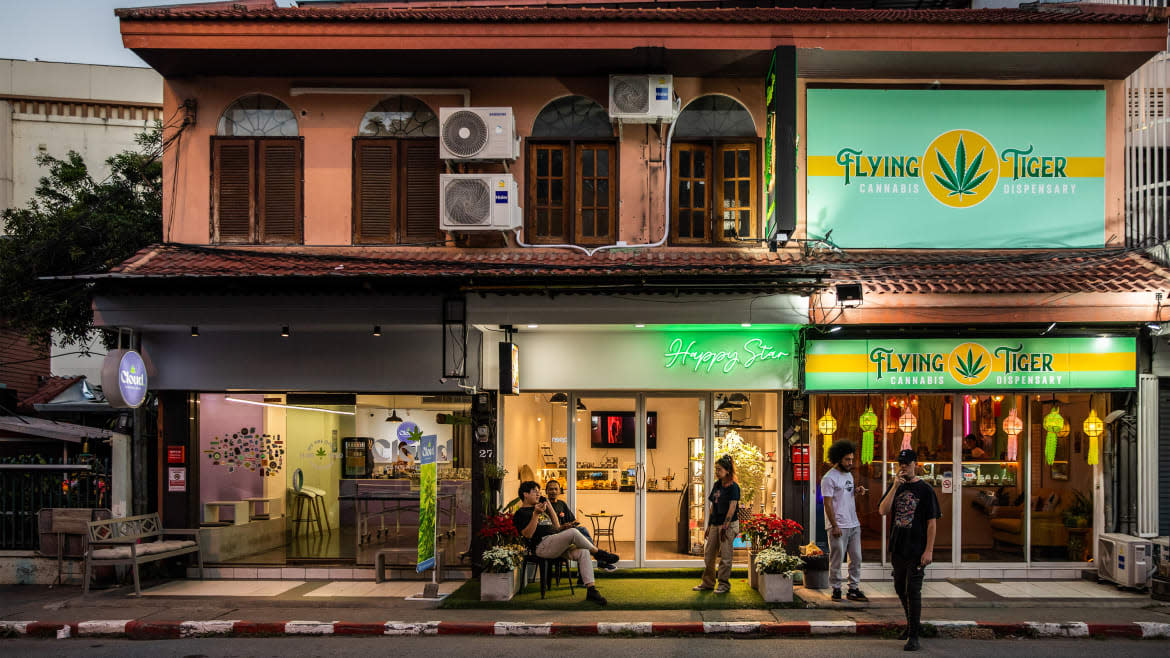
Aside from a few canals and the seasonal influx of backpackers, there was previously little in the way of similarities between the capital of the Netherlands and Thailand’s second city Chiang Mai. But that all changed this summer, when cannabis use was decriminalized and the “capital of the north” turned into a smokers’ paradise overnight. On first glance, Chiang Mai looks like it could be the new Amsterdam.
“It’ll be the Amsterdam for East Asia,” muses Sunny of weed cafe Three Bees. Sunny, as well as others, requested only their first names be used due to fluctuating laws. “There’s a lot of South Korean and Japanese people coming, looking for really high-grade weed and the farmers are becoming very good growers here. So imagine in five years, it’ll be the best weed in Asia.” It’s not a prediction you would have made this time last year, but it feels entirely plausible now.
Regular visitors to Thailand will no doubt find this new legislation surprising; the Kingdom previously took a very strong stance on cannabis possession. If found with so much as a joint on them, tourists could expect a visit to the “Bangkok Hilton” (a nickname for Bang Kwang Central Prison, where foreigners with drug offenses were held). Cut to six months on from the new laws being introduced and the green queen is on sale everywhere, particularly in tourism hotspots like Chiang Mai.
All is not completely rosy; there’s constant backpedaling (edibles and pre-rolled joints have recently been removed from all dispensaries) as the laws are very vague and changeable. But you wouldn’t know it strolling through the night markets. Lapping a night-walking street is a vacation highlight and Chiang Mai has some of the best in the country, where heaving crowds bustle along the one-way systems, shopping for food, gifts, and clothes. Now, a chunk of gift-laden stalls also sell weed and paraphernalia. Cute pipes, made of blown glass and crafted into your favorite animal sit alongside pots, labeled to explain the grade of sinsemilla inside and—of course—the price. If you can’t make it to a night market, fear not; nightclubs, restaurants and maybe even your hostel or hotel have a range on sale, too.
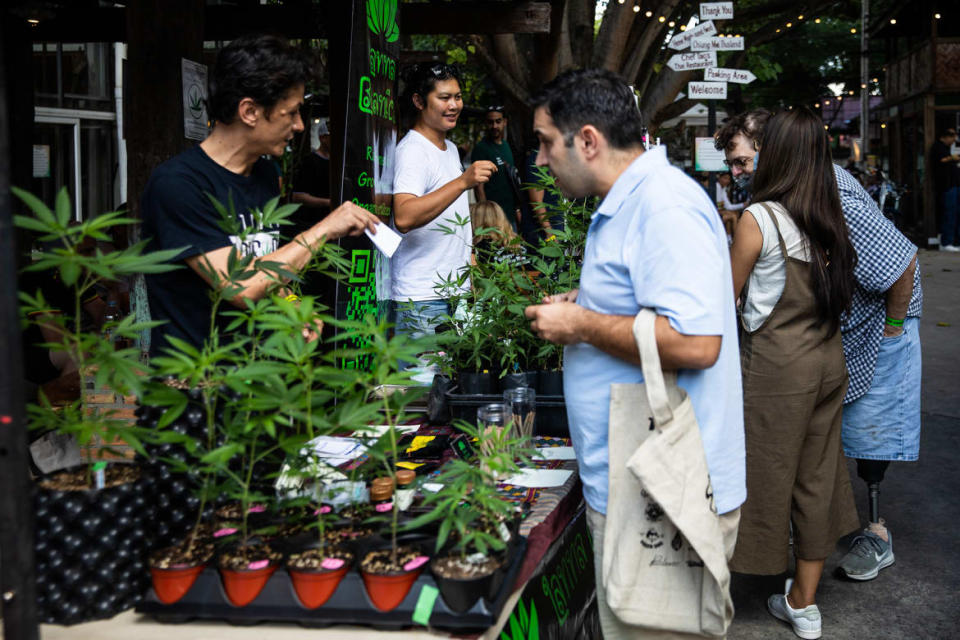
Vendors sell cannabis plants to customers at the Thai High Convention on Dec. 10, 2022 in Chiang Mai, Thailand. The Thai High Club hosts its first cannabis festival in Chiang Mai to celebrate the newly legal industry in Thailand.
Connoisseurs know better than to grab their bud on the street though, and Chiang Mai is suddenly a haven for that clientele. The old city, the heart of the metropolis, surrounded by a 13th-century moat, has almost 30 weed cafes and dispensaries, with names to suit purpose: Amsterdam Cafe, Stash Dispensary, Stoner CNX, Green Ganesha, and Wake’n Bake all do a solid daily trade. That’s not to mention the slew of spots outside the city walls. These new vendors operate in both traditions—the stereotypical, slightly grungy weed shops sit alongside virtually clinical, minimalist cafes. Essentially it depends on what the place was prior to its repurposing.
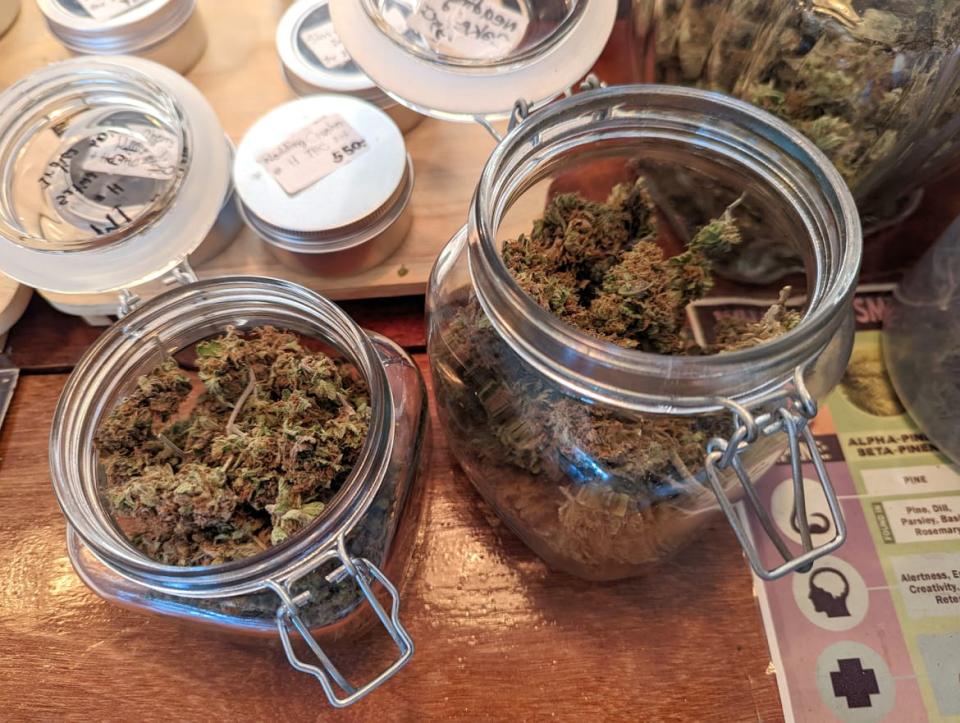
Mavoix coffee shop in northern Thailand.
One of the top dispensaries in the old town is award-winning coffee shop Mavoix, one of a chain of venues in northern Thailand, which has two branches in the city. Huge windows see light pouring into the smart, airy spaces; they formerly sold posh coffee, grown on their own farms and roasted in house. Now they sell 25 different strains of high-grade weed. Manager Katoon is flourishing in her new role of cannabis adviser. “I recommend sativa, it makes everybody happy,” she beams. Last month the local police came to update her on her license: the cafe can sell weed or coffee, but not both. She obviously stuck with the cannabis. “We have to be flexible but it’s OK, we can follow their orders, no problem, but I hope the government doesn’t change the law again.” Weed is good business.
She’s got more on her mind than sales though. “I hope magic mushrooms become legal in Thailand, as well as weed,” she explains. “We’d like to sell everything for an active, positive mindset. I’m looking for a university course to study. I want to help people manage their depression and anxiety.” The medicinal benefits of cannabis are high on the agenda for the high-end sellers.
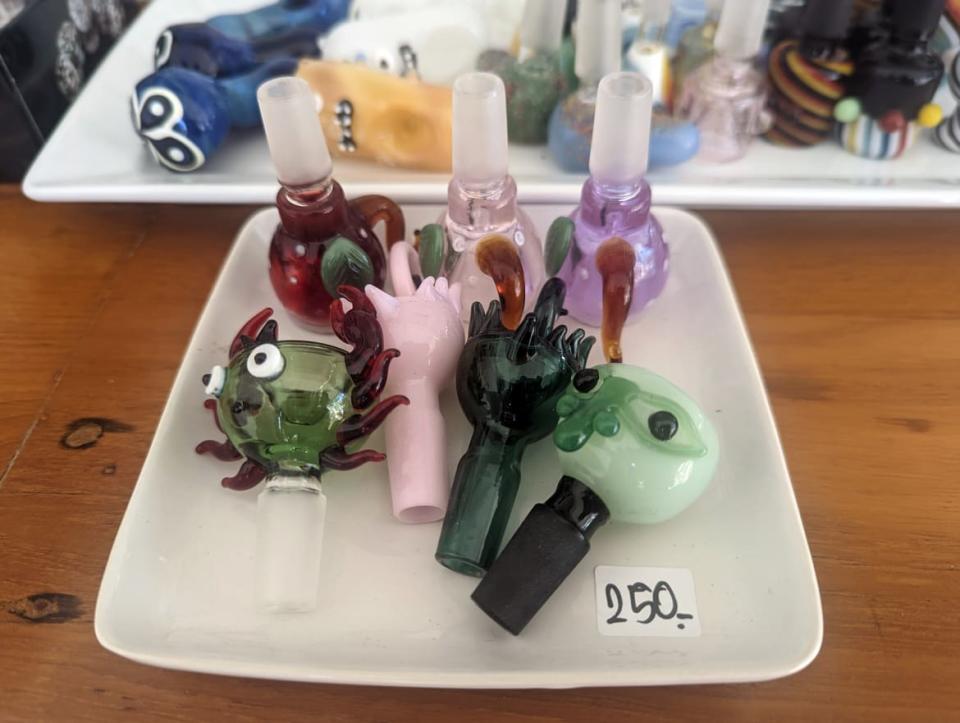
Glass pipes at the night market.
Before the legalization, Bruce and his team were already growing for government health facilities. “We have a small farm on the grounds of a hospital in Lamphun in fact,” he says. Now they run High Speed 420 Weed Shop & Medical Cannabis Dispensary, a top-of-the-range outlet on the grounds of a go-karting track in Hang Dong, a short drive out from the old city. “Our slogan is ‘Smile, it’s healthy’,” he explains, displaying the well-branded products that range from cannabis tea bags and bottled cannabis tea drinks to an impressively wide range of weed that all come with an instructional label and a helpline number, should you have any further questions about how to use the product. Education is in the foreground. “Before you didn’t know what kind of weed you were getting,” Bruce recalls. “No one cared about the THC level, the strain, the attributes and data. Nobody sought information like that until now. Now we hope to share this information.”
However, there’s a huge gray area that all cafes and dispensaries are currently wrangling with here—where to have their customers smoke. While cannabis is removed from Thailand’s list of banned narcotics, smoking it in public is still forbidden. Technically this includes the weed cafes, too. This poses little problem for locals, who can smoke in the privacy of their own homes, but leaves tourists out on a limb. “Tourists come here and stay at the hotel—hotels don’t want them to smoke in their rooms. So what do they do? Where else can they go?” Bruce asks. He’s got a sign up, requesting his clients not smoke on the premises, but it doesn’t make a great deal of sense. “They should be smoking where you can have watchful eyes on them. But these things are still unclear. We’re doing what the government wants us to do—so we’re in good shape, we’re thinking long-term.” Other dispensaries are not so vigilant; many permit smoking on their premises and there’s a gentle whiff of weed in the air outside most bars and clubs in the city now too.
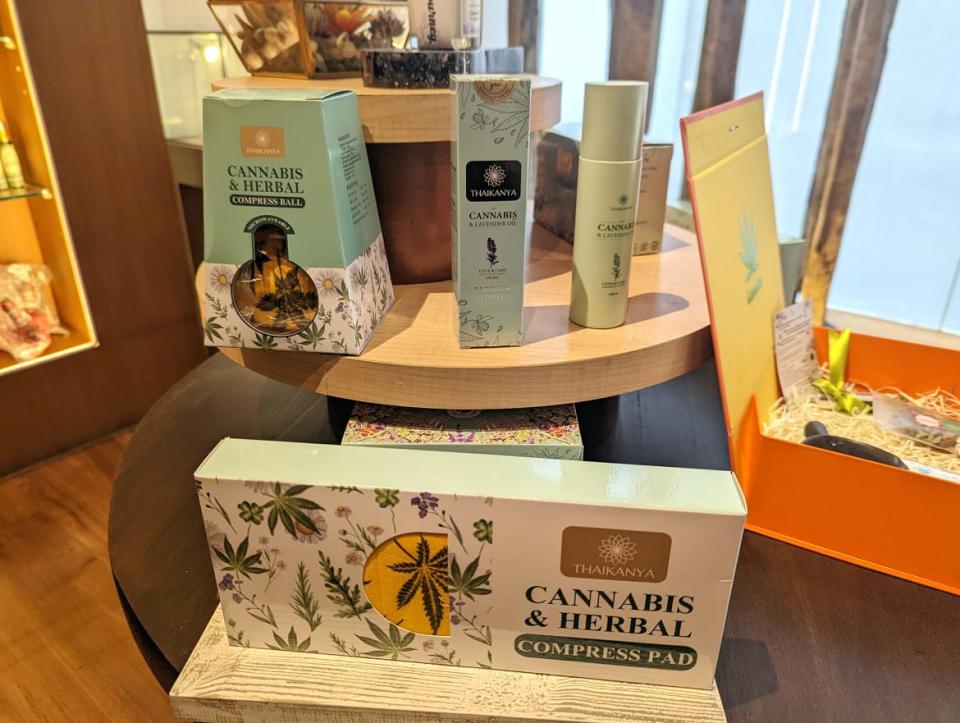
Products at Anantara.
This new tourism is being nurtured across the spectrum of experiences, with five-star hotels making the most of the laws, offering cannabis oil massages. The first in Thailand to have such a menu was the luxurious local chain, Anantara. They use Thaikanya products, the oils of which contain 0.001% THC and are promoted in the healing section on the spa menu. A “Restful Slumber Massage” is just one of the treatments Khun Por, spa director at Anantara Resort Chiang Mai, offers guests experiencing stress or anxiety. “We get a lot of comments from guests that they’re more relaxed after than when we use essential oil,” she says, “but not many tourists are aware that this is something we offer, not yet.” Cannabis use in whatever form is still a side product of tourism in general, with few tourists aware of the cultural shift until they get here.
This is probably just as well, as the legalities for cannabis users only seem to get blurrier week on week, with a recent announcement from the government stating that pot-smoking shops are now illegal. It hasn’t changed the landscape in Chiang Mai but fines are being issued to unlicensed sellers in Bangkok. Could a clean-up be looming? License holders like Toonie aren’t too concerned. “We have a weed farming license, so we can sell buds in our dispensaries, no problem,” she says, pruning a crop of Lemon Cookie ganja. The pre-rolled joints and edibles have been removed since this new update, as they’re now contraband, but she hopes a separate license will be available to sell them again soon. The multitudinous jars of weed remain. While the laws are in a state of flux and the boundaries of cannabis use are hazy in Thailand, it seems unlikely that Chiang Mai will become the new Amsterdam in this year’s peak season, particularly without safe places for tourists to smoke, but the availability is certainly here and doesn’t look to be diminishing. Make the most of it—at your own risk.
Get the Daily Beast's biggest scoops and scandals delivered right to your inbox. Sign up now.
Stay informed and gain unlimited access to the Daily Beast's unmatched reporting. Subscribe now.

